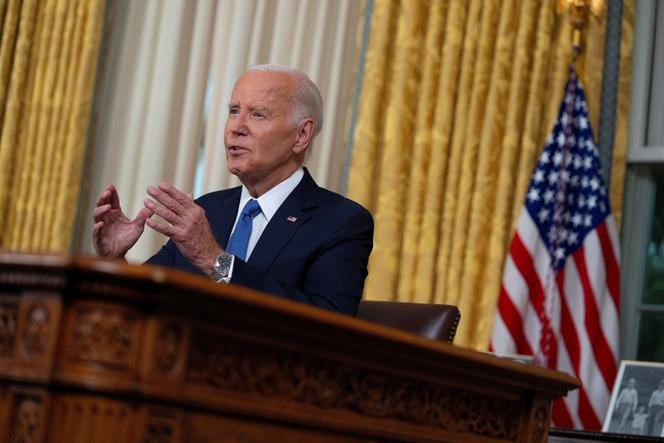

Biden begins farewell tour with solemn address to the nation: 'The defense of democracy is at stake'

A farewell tour began in the Oval Office of the White House early in the evening of Wednesday, July 24. Freshly recovered from a Covid-19 infection, US President Joe Biden had chosen it as the setting and time for a solemn speech. This gave substance to his letter, published on Sunday, July 21, in which he announced his decision to step down for a second term, at the age of 81, and entrusted his vice president, Kamala Harris, with the mission of keeping the US presidency for the Democratic camp.
Seated behind the Resolute desk, framed by photos of his family, whose joys and sorrows have accompanied him throughout his career, which spanned more than half a century, Biden seemed solemn. Far more solemn than another elderly president, Ronald Reagan, had been when he, a Republican, took leave of his fellow citizens in January 1989, at 77, in an almost identical setting.
Unlike him, who ended his term with the satisfaction of seeing his vice president, George H. W. Bush, succeed him, Biden couldn't delve too deeply into the reasons for his surprise withdrawal: The weakened physical state, revealed by the calamitous June 27 debate that threw his party into stupefaction, and the fear of an electoral rout in the November 5 election. Mounting pressure from leading Democratic officials had on out over the president's initial resistance to requests to withdraw.
The explanation he gave to his fellow citizens, who were very largely opposed to his renewed candidacy, was more allusive. "When you elected me to this office, I promised to always level with you, to tell you the truth. The truth, the sacred cause of this country, is larger than any one of us," said Biden. "In recent weeks, it's become clear to me that I need to unite my party. (...) I believe my record as president, my leadership in the world, my vision for America's future all merited a second term, but nothing, nothing can come in the way of saving our democracy. That includes personal ambition," the president continued.
"So I've decided that the best way forward is to pass the torch to a new generation. It's the best way to unite our nation. I know there is a time and place for long years of experience in public life. There's also a time and place for new voices, fresh voices, yes, younger voices, and that time and place is now," he added.
Unlike Reagan, who exuded optimism at the time, confident in the solidity of American institutions and no doubt already convinced that he had won the Cold War, Biden was somber because he knew that his track record, which he has striven to defend, has been severely criticized by the American people, and that war rages on in Ukraine and Gaza. Moreover, he was still convinced that American democracy was under threat. According to him, this threat is embodied by the candidacy of Donald Trump, whom he never once mentioned by name or party, by his denial of the results of the 2020 presidential election, and by his contempt for institutions, which he caricatures as the "deep state."
You have 17.48% of this article left to read. The rest is for subscribers only.
